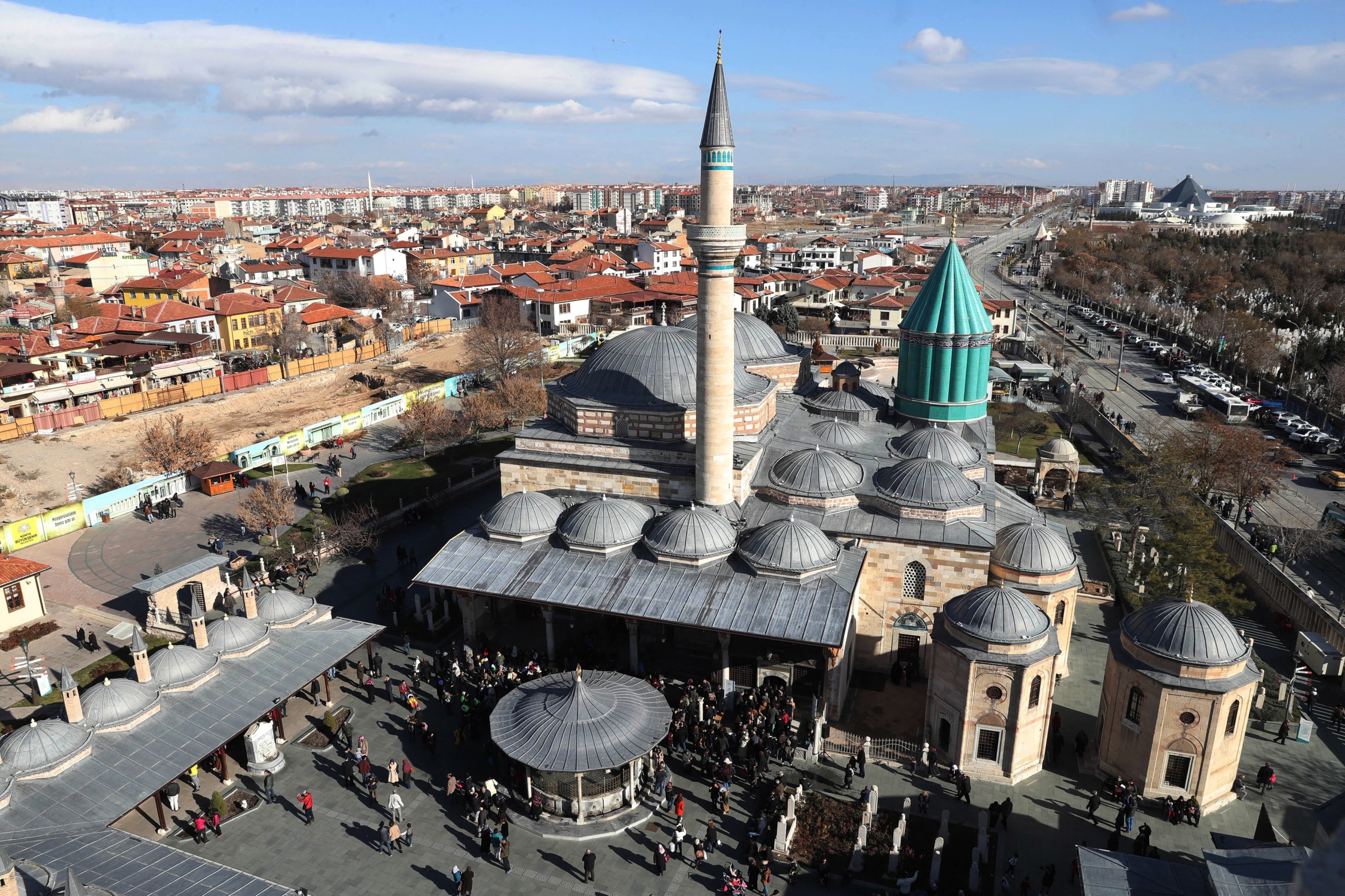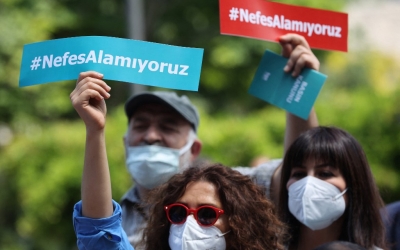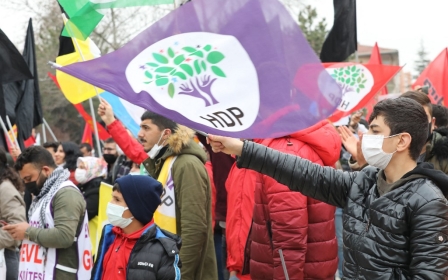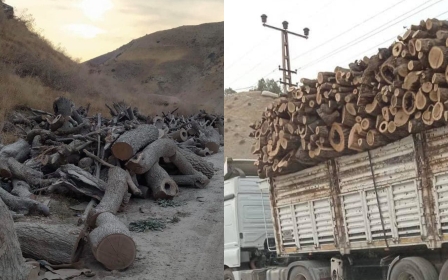Turkey: Seven Kurdish family members killed in 'entirely racist' attack in Konya

Seven members of a Kurdish family were killed by armed assailants in the central Turkish city of Konya in an "entirely racist" attack, according to the family's lawyer.
The Dedeoglu family had long been living in fear after threats from Turkish locals, who allegedly told them that they were Turkish nationalists who "would not let Kurds live here".
Members of the family had previously been seriously injured in an attack in May, but the suspected perpetrators were released from custody.
Despite being left with severe injuries, including a brain hemorrhage and broken limbs, the family said the police effectively tried to pin the blame on them.
Baris Dedeoglu, who was killed in Friday's attack, said at the time of the previous assault that the attackers told them to "call the police to come and help you". But when the police arrived, they instead questioned the family, asking: "what have you done to the men?", according to the Duvar news site.
New MEE newsletter: Jerusalem Dispatch
Sign up to get the latest insights and analysis on Israel-Palestine, alongside Turkey Unpacked and other MEE newsletters
"However, we were all injured and it was us who were attacked at home. Many members of the family who organised the attack on us were released later on," Baris said.
Following the killing of the family on Friday, their lawyer, Abdurrahman Karabulut, said the "judiciary and the authorities" were responsible for allowing the perpetrators of the previous attack to go free.
"This was an entirely racist attack," he told Arti TV.
'Kurdish phobia'
Mahmut Togrul, an MP for the pro-Kurdish Peoples' Democracy Party (HDP), said that the attack was an outcome of the anti-Kurdish policies and rhetoric of the government and its allies.
'The constitution does not cover the rights of the [Dedeoglu] family, as they have openly signed themselves as Kurds'
- Devris Cimen, European representative for the HDP
"The same family was attacked and those who carried out the attack were released. The murderers returned and have now massacred the entire family," he said in a statement.
"The regime's discriminatory, hateful language and anti-Kurdish attitude are the main causes of the murders."
Until recently the ruling Justice and Development Party (AKP) had been seen as moderately in favour of Kurdish rights and enjoyed support among conservative Kurds in the country's southeast. But after fighting broke out with armed groups in the Kurdish regions in 2015 it adopted a more overtly Turkish nationalist stance.
Since 2018, the party has been in an official alliance with the far-right Nationalist Movement Party (MHP), who are fiercely opposed to Kurdish rights. The party is also affiliated to Ulku Ocaklari, more commonly known as the Grey Wolves, an organisation that has been responsible for numerous murders and attacks on Kurds, Armenians, leftists, and members of the Alevi religious minority since its founding in the 1960s.
Turkish Interior Minister Suleyman Soylu, an AKP member but seen as close to the MHP, said in a statement that attributing the killing of the Dedeoglu family to anti-Kurdish racism was a "provocation" and said a years-long feud between different families was the cause of the violence.
"This attack is not connected to the Turkish-Kurdish issue. Making a link to this is as dangerous as the attack," he said on television, according to AFP.
The foreign minister of Iraq's Kurdistan Regional Government (KRG), Safeen Dizayee, also condemned the attack in Konya, calling for the perpetrators to be "brought to justice immediately".
The family's murder is the second attack on Kurds this month in Konya, a religiously conservative city that is the heart of Turkey's Sufi Islamic traditions.
On 21 July a Kurdish farmer was killed in a nearby village by attackers who reportedly shouted "we don't want Kurds here".
The European representative for the HDP, Devris Cimen, told MEE that the attack on the family was indicative of a state which did not value Kurdish lives.
"This absurd Kurdish phobia in Turkey has its roots in the Turkish constitution. Turks are educated to do what they do by seeing it as their right," he said.
"The constitution does not cover the rights of the Konya family, as they have openly signed themselves as Kurds."
HDP crackdown
Kurds make up around a fifth of Turkey's population, with the largest number living in the southeast and in Istanbul.
Since the founding of the Turkish republic in 1923, Kurdish identity was heavily repressed and attacked as "seperatism", with the Kurdish language being effectively banned at various points in the country's history and pro-Kurdish organisations and parties regularly closed down.
Though the 2000s saw improvements in Kurdish rights, in recent years pro-Kurdish organisations have come under heavy pressure again.
The HDP, which is the third-largest party in the Turkish parliament, has been targeted by mass arrests since 2015, with local mayors and councillors routinely dismissed and imprisoned.
A number of senior politicians, including former co-chairs Selahattin Demirtas and Figan Yuksegdag, are currently in jail.
The party is accused of being linked to the Kurdistan Workers Party (PKK), an armed organisation that has been involved in a guerilla war with the Turkish state since 1984. At least 40,000 people have been killed in this conflict and human rights abuses have been committed by both sides.
Last month, the Constitutional Court put the HDP on trial over its PKK links, which could eventually lead to its closure.
MP Hisyar Ozsoy told MEE in March that the party's central board was examining a number of options for the upcoming parliamentary elections - set for 2023, but possibly occurring earlier - should the court rule against them.
"It may be another political party, it may be independents, using the list of an already existing party," he said, via phone.
"These are all options, but they may even try to prevent the HDP from running as a different political party."
Noting the repeated obstacles that have been thrown in the way of progressive political parties in Turkey in the past, he said that, regardless of what happened, the HDP as a movement would not disappear.
"The HDP is not just some headquarters, some building, some people. We do have a powerful historical tradition of diverse struggles in Turkey."
Middle East Eye delivers independent and unrivalled coverage and analysis of the Middle East, North Africa and beyond. To learn more about republishing this content and the associated fees, please fill out this form. More about MEE can be found here.





